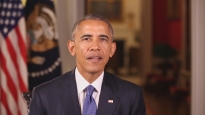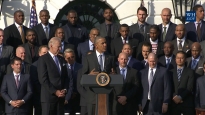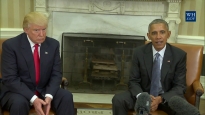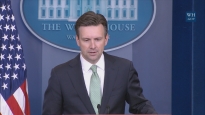Press Briefing
December 08, 2011 | 45:39 | Public Domain
White House Press Briefings are conducted most weekdays from the James S. Brady Press Briefing Room in the West Wing.
Press Briefing by Press Secretary Jay Carney, 12/8/2011
James S. Brady Press Briefing Room
12:07 P.M. EST
MR. CARNEY: Okay. I will engage in what I trust will be a brief briefing. I don’t have any announcements. I think we put out the trip next week, correct? To Fort Bragg. And the President looks forward to that visit, even more than he looks forward to spending a lot of time with you as we get closer and closer to Christmas. (Laughter.)
Questions.
Q Share the wealth.
MR. CARNEY: Share the wealth. Reuters.
Q Can I ask about Russia?
MR. CARNEY: Yes, please.
Q Prime Minister Putin today was accusing the U.S. of interference in Russian affairs. I wondered what your response was to that, and where concerns about the problems with the elections leave the reset of U.S.-Russian relations.
MR. CARNEY: Well, Secretary Clinton spoke to this issue in Brussels today. The United States and Russia have many common interests, as you’ve heard me discuss, and this administration has sought to develop and nurture those interests.
Through engagement with the Russian government, we have advanced several of our top security and economic interests. We will continue to seek opportunities for cooperation with Russia, based on mutual respect and those common interests.
At the same time, we have sought to deepen our engagement with Russian society and to promote universal values. When rights are violated in Russia, or in any other country, we speak out. We are going to continue to pursue both tracks of engagement in the promotion of our interests and our values.
I’ll go on to say that we are encouraged by President Medvedev’s commitment to have the Central Election Commission investigate all election violations, and we welcome his acknowledgment that the demonstrations in Moscow and other cities are part of the democratic process.
Yes.
Q What specifically would the administration be willing to compromise on, as it relates to the appointment?
MR. CARNEY: Well, I don’t think the President indicated any efforts to compromise. I think he made a very compelling case for why a law that was debated, negotiated, and passed successfully through Congress and was signed into law by the this President should be implemented.
As I think he said in response to Ed’s question, if there are members of Congress in the Senate or the House who have a problem with the bill or with the law as it is, and want to change it, submit a bill. Don’t block it through parliamentary tactics, the implementation of the law of the land. Because who loses? Not the non-financial -- or rather non-bank financial institutions, the oversight of which is being held up because of the Senate Republican filibuster. The people who lose are the American consumers who engage with those non-bank financial institutions all the time -- payday lenders, and mortgage service providers, student loan companies -- veterans. So they ought to do the right thing for American consumers. Don’t do it for the President. We’re not naïve enough to believe that, whether it’s a payroll tax cut or a confirmation, they would do it for that reason. But they ought to do it because their constituents are demanding it.
Brianna.
Q On Plan B, the critics in your -- there are some critics in your own party who say that science lost to politics. Did this have anything to do with politics?
MR. CARNEY: I think the decision was Secretary Sebelius’s decision. The President, as you heard, supports that decision, and I think he gave pretty compelling reasons for why he supports the decision, both as President and as a father.
And then to the question of politics with regards to this or anything else, I covered politics for a long time, and I’m just -- I can’t figure out what the right -- there are politics in every issue, and there’s an upside and a downside to every issue. And usually, it’s hard to know in advance how these things will play out politically, which is just another reason why decisions like these ought to be made on the merits, and that’s what Secretary Sebelius did.
Q But he framed it in terms of 11- and 13-year-old girls. The cutoff is not 13, it’s 17.
MR. CARNEY: The current cutoff is, right. But the --
Q So in terms of 16-year-old, 15-year-old girls, who studies show many of whom are sexually active and would actually have more use for the morning-after pill -- he didn’t talk about it in those terms.
MR. CARNEY: No, he didn’t. But the decision that the Secretary made was to say yes to or say no to the allowing of any girl of any age -- or younger girls included -- I mean, not just 16-year-olds, but it was a -- it would have resulted in allowing, as the President said, somebody to buy it along with batteries and bubble gum. So -- a 9-, 10-, 11-year-old.
That was the decision that Secretary Sebelius faced.
Bill.
Q Does the President have any reaction to the stiff sentence handed down to former governor Blagojevich?
MR. CARNEY: I have not heard him discuss that, so -- I know you -- he didn’t respond to your question, so I don’t know if he has a reaction.
Q Can I ask why you think -- I mean, the President comes in and makes what he believes is a compelling case that Republicans are blocking this person who would really help middle-class Americans.
MR. CARNEY: You believe it, too, Ed, come on.
Q Of course I believe it. (Laughter.) In all seriousness, how -- why is it not breaking through, then -- let’s forget about the Republican leadership, people like Senator McConnell, who have been opposed to the President on a lot of things -- Susan Collins, you’re targeting her, in a way, by reaching out to the media in Maine; you’ve made this big PR blitz all week where you’ve billed as, like, we’re really going to pressure people on the fence on this. And people like Susan Collins have heard the President’s case and they just say, no, I don’t agree.
MR. CARNEY: Well, you make a good point, that this club of Republicans in the Congress are sometimes at odds not just with the President but with a overwhelming majority of public opinion for things that this President also happens to support.
So I think that if there were a referendum or plebiscite in Maine, I feel pretty confident that Democrats, independents and Republicans would support the confirmation of a consumer watchdog whose job it is to look out, in Washington, for their interests in their dealings with financial institutions. As the President said, there’s this amnesia about what happened just a few years ago, and how it happened, and who got left holding the bag.
So, I mean, that’s a discussion that maybe you or your colleagues should have with Senator Collins or the other senators who unfortunately did not do the right thing today. But we hope, given the opportunity, they’ll do the right thing on another day.
Q But doesn’t it say something about his use of the bully pulpit that he’s trying this and it’s not working with people in the middle?
MR. CARNEY: We live in a challenging political environment, there’s no question. But in the end, everyone here -- the President, Vice President and every member of Congress -- answers to their constituents. And on every measure of the American Jobs Act, including the payroll tax cut extension and expansion, there is overwhelming public support -- Democratic, independent, Republican support. And referring to the payroll tax cut extension, I just -- we may be here through Christmas, but it would take an awful lot of chutzpah as well as, perhaps, political courage to go home, if you’re a senator or a congressman, and answer the question, “Why did you vote to raise my taxes on January 1st?”
Ben. You thought better --
Q I’m amending my remarks, yes, based on what you said there. I was thinking about the payroll tax. The President said yesterday that if it comes to him attached with “extraneous” issues not related to making sure the American people’s taxes don’t go up, it’s not something he’s going to accept. I’m just trying to get clarity on that. He would accept it if it’s attached to issues like unemployment insurance and the doc fix, right -- things you want?
MR. CARNEY: Well, I think that “extraneous” is something you know when you see. And clearly, unemployment insurance is very much an element of the same kind of proposal the payroll tax cut extension and expansion is, and that it goes directly to assisting Americans make ends meet, and it has extremely positive impacts on the economy, on economic growth and job creation.
The Keystone project is being reviewed in a process that was established through many decades of precedent at the State Department. It is being reviewed in a way that allows and has allowed for substantial public comment, as well as input from agencies across the government. And it is being reviewed in a way that takes into consideration the criteria that you’ve heard the President himself lay out as the most important criteria to be considered. That process needs to be allowed to be pursued, and the State Department has said that that will take a certain amount of time, and that’s what should happen.
It should not be, as the President said, a situation where leaders in Congress -- Republican leaders in Congress should be bargaining for political priorities in exchange for giving this President the payroll tax cut. Whatever happened to Republicans being for tax cuts? Is it because this one goes to 160 million Americans, middle-class working Americans, that they’re ambivalent or they’re willing to oppose it if they don’t get some political scalp? Is it because President Obama supports it, or Democrats support it? It’s confusing to me, and I think it’s confusing to a lot of people, and based on the data I’ve seen it’s confusing to a lot of Americans.
So no extraneous attachments.
Q Would that cover, for example, some of these environmental issues besides Keystone that Republicans are pushing? Would that be extraneous?
MR. CARNEY: Besides Keystone? Again, I think it’s likely that something like that would be extraneous. I don’t want to negotiate from here. Keystone is clearly extraneous.
Laura.
Q Thanks. You said that it was Kathleen Sebelius’s decision on Plan B. We also heard the President’s views on the subject. Did he or anybody else in the White House communicate his views to her before she made the decision?
MR. CARNEY: It is certainly -- broadly speaking, I don’t know with regard to this specific issue, but it’s broadly the case that there is communication between agencies and the White House on matters like these and decisions that are made at those agencies like the Department of Health and Human Services or other departments. But in this case, as the President said, he had no involvement in the process. He supports the decision, and it was very much Kathleen Sebelius’s decision.
Q And did anybody -- I understand you’re saying it was her decision, but there are lots of ways that you can come to a decision --
MR. CARNEY: Look --
Q -- if I could just finish the question.
MR. CARNEY: Sure.
Q You can come to a decision, for instance, after speaking with somebody at the White House who advises that, for any number of reasons, this is something that the White House would prefer. And putting the President himself aside, did anybody on the --
MR. CARNEY: The implication in your --
Q -- in the White House communicate that to --
MR. CARNEY: I get where you’re headed. The implication in your question is that Kathleen Sebelius doesn’t support this decision. I think you ought to ask her, because she does and she made it. So there is communication between the White House and agencies in a decision-making process like this, but the decision is made by the Secretary in this case, and it was made by Secretary Sebelius. The President had no involvement in that, as he just said, and this was her decision, and I think she put out a statement explaining it. The President supports it.
Q But I’ve seen -- been in Washington a while, long enough to see Cabinet secretaries make decisions that they don’t personally agree with. I don’t know what is in the mind of Kathleen Sebelius. I’m just asking whether there was any influence on the part of the White House staff in her coming to that conclusion.
MR. CARNEY: No, again, there was communication. But the implication of your question is that influence to get her to change her mind -- this was her decision. She made it and she clearly supports it, as articulated in her statement.
Yes, Peter.
Q Jay, the chairman of the House Judiciary Committee this morning said he wants to see work product from Elena Kagan before -- in a period before it became clear that she was under consideration for the Supreme Court. Does the President support -- is there any reason the President feels that those documents should not be turned over in that two-month timeframe? And does he feel that she retains her impartiality in the health care case?
MR. CARNEY: Justice Kagan was confirmed with bipartisan support to the Supreme Court; went through the usual thorough confirmation process. I would point you to the statement by President Bush’s former attorney general on this matter, and his views on whether or not there’s an issue here. We agree with him.
Yes, Jon-Christopher.
Q I have another Plan B question, but this is a fiscal follow-up on what the President said earlier regarding the eurozone. Does the administration have a plan B to protect the U.S. economy -- (laughter) -- if its European leaders do not reach an agreement -- a debt agreement tomorrow in Brussels, especially now that S&P is threatening to downgrade all of Europe?
MR. CARNEY: He’s focused on his plan A, which is passage of the payroll tax cut extension and expansion, passage of extension of unemployment insurance, passage -- if members of Congress come to their senses -- of the other elements of the American Jobs Act.
He will not relent just because there is political opposition. And as he made clear here, he will stay as long as it takes in Washington to make sure that Congress doesn’t allow 160 million Americans to experience a tax cut next year.
Q And that will have a positive effect on what’s going on in Europe tomorrow during this --
MR. CARNEY: Well, you asked what his plan B was for the American economy. And as I’ve said, and he has said in the past, and Secretary Geithner, is he’s focused on the things you can control. You obviously engage on the issues that are not entirely in our control, like Europe. That’s why Secretary Geithner is in Europe this week; why President Obama is in frequent communication with his counterparts in Europe, especially Chancellor Merkel and President Sarkozy, as he mentioned today.
But you need to buy that insurance, if you will, for your own economy, for the American economy, by taking the decisive action that you can take, through Congress and outside of Congress, that can help buffer the American economy and protect it from the kinds of shocks that happen inevitably in the global economy -- whether it’s the situation in Europe, or earthquake and tsunami in Japan, or unrest in the Middle East that affects oil prices. Those are the kinds of things that are not entirely in our control, and that we need to ensure against. That’s why it is so essential that we take the measures we can take to ensure that we continue to recover from the worst recession since the Great Depression. It’s why we need to put $1,550 in the pockets of the average American family next year, and why we need to make sure that those 5 million folks who are looking for work continue to get the kind of assistance they need.
All the way in back. Yes.
Q The leaders in Pakistan have been talking about new talks of engagement with the U.S. Have they given you any indication of what these new talks of engagement with the U.S. is going to be, and how is it going to be different from the present one?
MR. CARNEY: Not that I’m aware of, but, as you know, we have regular contacts with the Pakistani government. But I don’t have any new information on those consultations.
Kate.
Q The Senate Democrats’ plan would charge higher fees to lenders by Fannie and Freddie, which would eventually lead to higher interest rates for borrowers. So wouldn’t that eventually come down to hurting the middle class in the end? And then also, I wondered if you had any reaction to Governor Perry’s ad vowing to end Obama’s war on religion.
MR. CARNEY: I don’t have any reaction on what sounds like -- well, I don’t have any reaction. (Laughter.)
Q That’s quite a reaction.
MR. CARNEY: As for the Senate Democratic bill, you mean the new --
Q Yes.
MR. CARNEY: -- payroll tax cut bill? We support it. The President has put forward his preferred pay-fors; the Senate Democrats have come forward with alternative pay-fors now, twice, and we support those measures. I don’t have anything specific for you on that. I mean, this administration has made clear its views on winding down, or -- is that the correct language? -- on reforming Fannie Mae and Freddie Mac.
So I just don’t have a lot of specifics with regards to that provision for you.
Q Because it would end up eventually hitting the middle class --
MR. CARNEY: Well, again, I think that that’s in a vacuum perhaps. But there are a lot of other moving pieces with regards to those institutions.
Yes.
Q Do you have any reaction --
MR. CARNEY: And then Scott. Go ahead. No, no, you first. Sorry.
Q Okay. Do you have any reaction to Mitt Romney specifically calling out the President’s vacation as evidence of his lack of hands-on -- that the only thing he’s hands-on with is his golf club -- and that if he were President he would take a much shorter vacation, which seems to kind of be what’s likely to happen considering what’s happening on the Hill. But still, this attack coming from Mitt Romney.
MR. CARNEY: I would just refer you to what the President said about the possibility of the holiday vacation for him, and the, I guess, increasing likelihood that it will be shorter than anticipated because he is absolutely committed to working with Congress as well as perhaps forcing Congress to stay here to get the absolutely necessary work it needs to get done, done.
I have to say -- because this is obviously criticism to the President for whom I work -- that I don’t remember Governor Romney having a hard time or complaining about this President’s predecessor taking his family on vacation, spending, I believe, far more time on vacation than this President. But you never know what he might have said, so you might want to go check it. (Laughter.)
Andrei Sitov.
Q Thank you, Jay. And thank you for your comment on this Russian situation.
MR. CARNEY: Nye za shto.
Q I must say that the actual comments from my country’s leaders are also much more balanced than they are depicted, and in the U.S. --
MR. CARNEY: I think we just -- I just -- we just commended President Medvedev for the statements he made.
Q Well, when you actually read what they said, other than what’s reported. But he did make an interesting observation -- I mean Putin in this case -- when he was talking to his supporters. He was responding to questions, and many of those questions were about, see, the Americans keep trying to influence our internal politics, keep spending money on it -- which is true, because I asked Mark Toner the other day at the State Department. He gave me a figure of $9 million that the U.S. spent on supporting the process of elections in Russia.
MR. CARNEY: We support democracy.
Q Right. And then Putin actually said that it’s much higher than that; it’s hundreds of millions. So I don’t know where he gets that figure, but it doesn’t strike me as impossible, either.
MR. CARNEY: Is there a question?
Q Yes. The question is, is it sort of -- is it worth it? Why do we want to do this, if this provokes this sort of reaction throughout the world? And I mean -- you are speaking out. That’s understandable. But actually spending money on this? Like I asked you yesterday about this --
MR. CARNEY: Again, I’m not -- I’m going to find a question in there and respond to it. (Laughter.) The State Department has a long history of engagement with countries around the world and the democratic process. It should not come as a surprise to anyone that we, the United States of America, support democracy for everyone around the world -- and that we have made clear in our improved relationship with Russia the importance of our common interests, the successes that I know you’ve reported on and everyone here has reported on, that we have had working with Russia on a number of important issues. But we also have sought to deepen our engagement with Russian society and promote universal values. And we will continue to do that.
And I think that is -- that both of those pursuits can proceed and be complementary.
Q What’s closer to the truth, the $9 million or the hundreds of millions?
MR. CARNEY: Again, I would take the State Department’s word for it.
Q Thank you, Jay.
MR. CARNEY: Yes. And then I said Scott. But, yes, you’re next and then Scott.
Q Take a shot on the Middle East again because the President was asked about appeasement, which is sure to make headlines in terms of his response, and he had that -- he took some heat from Republicans yesterday on Israel. Secretary Panetta’s remark last week about Israel just needing to get back -- “get to the damn table,” does that pretty much sum up --
MR. CARNEY: Well, again, first of all, I will say that was a reported remark from a private meeting, as I understand it. And if you’re asking me in general, is our view that both sides need to get to the table, the answer is, yes. We support direct negotiations between the Palestinians and the Israelis. We’ve made that abundantly clear. We support steps taken by both sides that make that more likely, and we oppose steps taken by either side that make it less likely, that make it harder to accomplish.
Q Is that more kind of over the --
MR. CARNEY: Again, I’m not going to comment on a remark -- I wasn’t there, I’m not sure it’s true as reported. So -- but broadly speaking, do we want Palestinians and Israelis to engage in negotiations and to reach a lasting peace deal that ensures Palestinian sovereignty and Israeli security? We do. We do.
Thanks very much.
Q Jay --
MR. CARNEY: Oh, Scott, sorry. I have short-term memory lapse.
Q Both you and the President talked about how the FDA recommendation would have put Plan B on the -- made it as accessible as bubble gum. So Tylenol and cold medicine are also sold alongside bubble gum. Does the administration believe that emergency contraceptive, because of its function, is in a different category than those other OTC medicines?
MR. CARNEY: Well, I think -- I’m not going to elaborate on what the President said. I think he was fairly clear. And on the more specific evaluations of this, I would point you to Secretary Sebelius’s letter. So I don’t have any more guidance for you than that.
Thanks.
END
12:31 P.M. EST
|
November 14, 2016
|
November 12, 2016
|
November 11, 2016
|
November 11, 2016
|
|
November 10, 2016
|
November 10, 2016
|
November 10, 2016
|
November 9, 2016
|
- &lsaquo previous
- …
- 9
- 10
- 11
- 12
- 13
- 14
- 15
- 16
- 17
- …
- next &rsaquo







